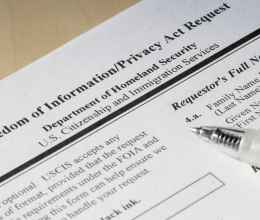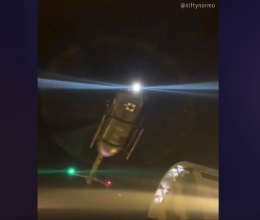The Foreign Intelligence Surveillance Court (FISC) is a special court created by Congress to authorize (or deny) U.S. intelligence agencies the right to conduct domestic surveillance activities in the name of national security. In general, the court’s activities are conducted in secret. The Foreign Intelligence Surveillance Court of Review (FISCR) is a special court created by Congress to review the decisions of the FISC in certain circumstances.
In November 2013, we filed a motion before the FISC seeking access to that court’s opinions and orders regarding the bulk collection of information about U.S. citizens’ communications, which had been disclosed by the Edward Snowden leaks. In response, the government released some opinions in redacted form. Claiming both First Amendment and common law rights of access, we asked the court to review those redactions and make its own decision about what to release. The government responded that neither we nor any private party had standing to seek such review.
In January 2017, the court ruled that we had no standing to seek unsealing of the opinions and the court therefore lacked jurisdiction to consider our motion. We sought rehearing en banc, and it was granted. In November 2017, the FISC issued its first-ever public en banc decision, holding by a 6-5 vote that we did have standing to seek access to the court’s opinions under the First Amendment. But the court sua sponte certified that question to the FISCR, which in March 2018 unanimously agreed that we had standing—while making it clear that standing did not imply ultimate success on the merits. The case then went back to the FISC.
On remand, the government argued that Congress had given the FISC jurisdiction only to adjudicate government applications for foreign intelligence collection and certain challenges by recipients of FISA process (e.g., subpoenas), and that our application was therefore outside the court’s jurisdiction. We argued that the FISC, like all courts, had inherent authority and ancillary jurisdiction over its own records.
In February 2020 the court held that it did have jurisdiction over our motion for access, but denied the motion on the ground that we had no First Amendment right to FISC materials, reasoning that neither history nor logic supported such a right. We sought review of that decision in the FISCR, but in April 2020 the FISCR ruled that it lacked jurisdiction to hear our appeal.
In a related case, we sought Supreme Court review of another FISCR ruling that it lacked jurisdiction to hear our appeal. In November 2021, the Court denied our petition, without comment. Justice Gorsuch dissented, joined by Justice Sotomayor. Summarizing his dissent, he said, “If these matters are not worthy of our time, what is?”



